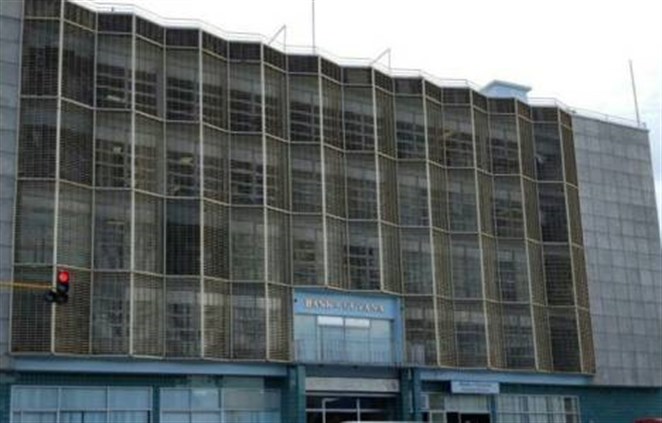GUYANA MAY BE JUST WEEKS AWAY FROM ECONOMIC CRISIS, SAYS ECONOMIST
Fuente: http://www.caribbeannewsnow.com/ with permission of the Guyana Guardian

Guyana’s Central Bank. http://www.caribbeannewsnow.com
GEORGETOWN, Guyana.- Having narrowly missed the economic after-effects of the 2008 Wall Street financial crash (the global financial crisis), and surviving a 2014 potential FOREX slide (since it is on the list of nations that could have suffered collateral damage from the 2014 oil slump); Guyana’s economic luck might be running out this time around.
At least this is the view of three respected financial experts, including a former World Bank economist, who predicted that Guyana may be weeks away from finding itself in the face of a recession demon that is similar to the ones that have been haunting neighbouring Venezuela, and Suriname among others, for some time now.
From experiencing a suddenly volatile currency exchange rate, stagnant economic growth, declining foreign investments, and a growing unemployment problem, Jeremy Blaine, a leading economic analyst at Accenture and a former World Bank consultant, told the Guyana Guardian that these are clear indicators that the writing is already on Guyana’s wall.
He noted that the government might have been caught in the middle of a spin-off from the underground economy that could have been brewing since the 2008-2009 global financial crisis, but which could have been made worse by current poor economic and social governance decisions.
In his opinion, a currently poor economy policy, a growing anti-investment climate, and a string of misguided taxation measures are taking a reverse toll on the country’s private sector, while the population’s spending power has been significantly reduced, to the detriment of the country’s overall economic outlook.
The economist stressed that one of many examples will be the poorly advised abrupt closure of sections of the sugar industry, which has since starved the economy of billions of dollars of surplus money that was previously being injected into the ailing sector from the treasury.
He reiterated that, even though government surpluses (such as the billions of dollars that were previously being injected into Guysuco) can indeed be an irritant to the treasury, it can actually turn out to be a blessing to the economy if the surplus money is going directly to the thousands of workers whose households would usually triple into thousands of consumers.
He further explained that in that way the surplus money ensures that the economy itself is being propped up, as the cash would usually spreads itself out across various commercial sectors.
Hence pulling that five billion dollars or so per year in budgetary surplus from Guysuco would mean pulling an average of $12 million per day from the extended economy.
And in such a case this will amount to reduced consumer spending power, reduced commercial income, and a reduction in tax intake.
Therefore, he is suggesting that government immediately take certain measures to increase consumer spending power, and to also create large scale employment opportunities.
“Unless the government can swiftly cut consumer taxes, offer direct foreign investment concessions, increase lending and spending via a central bank created digital currency which can substitute as a multi-billion dollar stimulus package, cut bank lending interest rates, hold off on closing down the sugar estates, re-engage migrating foreign investors such as Bai-Shanlin, and temporary insure certain classes of consumer credit, a recession will be imminent for Guyana,” he said.
While a string of recessions has been hitting the global economy hard, Guyana among several other countries was initially able to stave off the recession curse from hitting their shores.
But with several untested changes in government’s economic policy as of last year, a loss of several foreign export markets, and an increase in the global stranglehold on funding from several major donor countries, Guyana along with other nations has been losing out to direct foreign investments, investor created jobs, and needed foreign exchange, on a large scale.
For example, during the latter part of 2016, controversial Chinese company Bai ShanLin, and the Malaysian-owned Barama Company Ltd, began winding down their operations in Guyana, which has since seen just over 400 Guyanese directly and indirectly losing their jobs.
And with a handful of sugar estates facing closure, while certain agricultural sectors such as rice are being stifled by a limited export market, the government seems to be underestimating the potential economic woes that may be in waiting.
But as for an impending recession, many are doubtful that it is an experience that Guyanese may be prepared for.
However, many are still hoping that the government will initiate emergency measures that will be aimed at preventing a full-blown economic fall-out.








